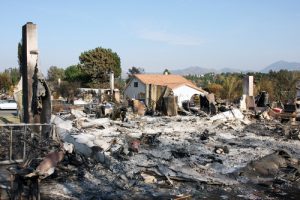Disaster Claims Fraud: When Catastrophe Strikes
Posted November 15, 2017 in Disaster Claims Fraud

Disaster Claims After Fires, Earthquakes, Floods, and Other Natural Disasters
Natural disasters wreak havoc on the rich and poor alike. Recent fires across California and the Pacific Northwest, hurricanes in the Caribbean and Gulf of Mexico, earthquakes, landslides, and a variety of other natural disasters have put many people in need of assistance. Disaster claims are a way to receive aid through your insurance policy when you’ve been adversely affected by a disaster. Legitimate disaster claims can provide financial assistance for needs such as rebuilding your home after a fire.
Disaster Fraud
Opportunistic predators will often take advantage of natural disasters and engage in deception for dishonest gain. For example, shortly after Hurricane Katrina, two men conducted a fraud scheme in which they deceptively registered identifying information of New Orleans police officers, firefighters, and other emergency personnel on the premise of rewarding them with charitable cash donations for their rescue and recovery efforts. The scammers were caught and arrested for false impersonation and conspiracy to commit identity theft.
Disaster fraud is a tactic people use to defraud other individuals or the government after a catastrophe. Some solicit charitable donations for disaster victims and then pocket the money. Fake websites are frequently used as a strategy to fool generous people and acquire credit card numbers or other personal information. Businesses or individuals may engage in price gouging, in which they increase the selling price of goods that are in high demand (such as generators or bottled water). Some vendors or contractors collect deposits for repair jobs that they have no intention of completing. Insurance fraud is when people claim inflated losses, demand unnecessary repairs, or even deliberately damage their own property to collect on their policy after a disaster.
The Costs
Disaster fraud affects everyone. Scams against government agencies cost every American in tax money. Fraudulent claims limit the amount of money that may be given to those in legitimate need. Insurance fraud also leads to higher premiums, which affects disaster victims and everyone else belonging to that insurance company. The penalties for filing a false claim include a hefty fine as well as imprisonment, with slight variations in state laws. When you file your own disaster claim, honesty is the best policy for you and everyone else.
Avoiding and Preventing Disaster Fraud
To protect legitimate disaster victims, disaster fraud must be avoided and prevented. Aid recipients are typically screened, and any possible insurance fraud is carefully investigated. As you file your claim, cooperate as much as possible by providing all relevant identifying information and disaster information to your insurance company. Regulatory agencies and insurance companies will have to confirm that you qualify for disaster aid. Volunteers are invaluable in disaster situations, but be careful of the kind of volunteer assistance you accept because they often attract opportunistic predators. Verify all proffered assistance measures with their respective organizations before accepting any aid, no matter how desperate your situation may seem. This will protect you from becoming a victim of disaster fraud.